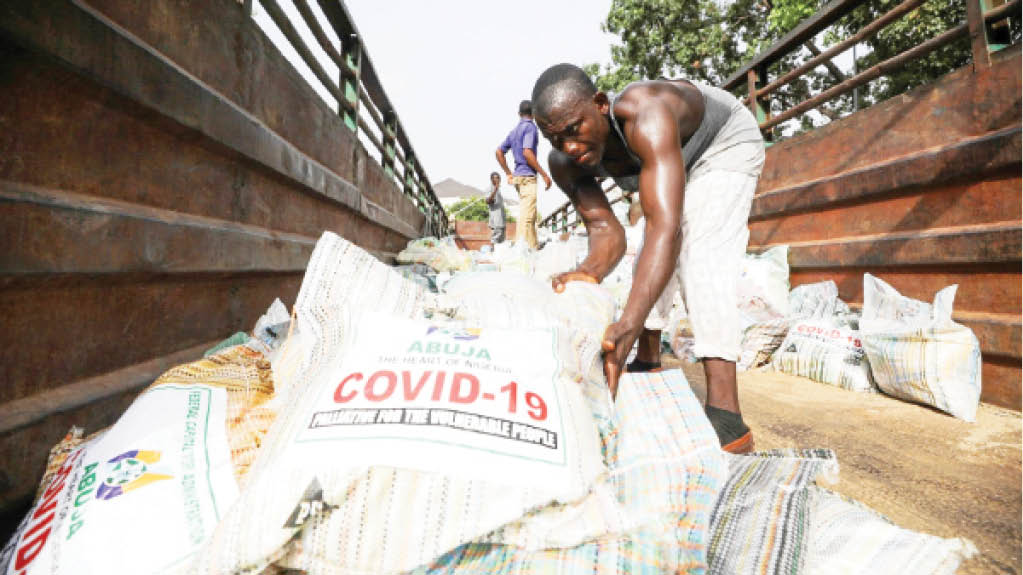The COVID-19 virus has infected over 79 million people since the first case was identified in Wuhan, China, in December 2019.
It has since assumed a pandemic proportion, killing a whopping 1,754,493 people worldwide as at 2 pm on Thursday 31 December, 2020, according to the World Health Organisation (WHO).
The first confirmed case in Nigeria was announced on February 27, when an Italian citizen in Lagos tested positive for the virus.
On March 9, a Nigerian citizen who had contact with the Italian was traced to Ewekoro, Ogun State, and recorded as the second case of the virus in the country.
Nigeria recorded the first death from the virus on March 22. As at December 23, 1,236 deaths have been reported across the 36 states and the Federal Capital Territory (FCT).
Five deaths daily
Although Nigeria is one of the countries with low fatality rates from the virus, the country averages five deaths daily since the first death from the coronavirus was announced in March.
The COVID-19 virus is not a respecter of status, age, colour or creed. It has broken through the seemingly impenetrable protective details of government leaders to claim its victims.
It has humbled respected medical personnel, physicians, top security chiefs, among others.
It does not care about the wealth or investment of captains of industry; not even the charming look of beauty queens could hold it captive.
It has defied traditional institutions, felling some of its custodians.
It hits palatial mansions in the same way it devours ghettos and slums with no sympathy.
The coronavirus has no boundaries and has made its way across all levels of society and age. It has travelled fast.
Nigeria’s first fatality
Suleiman Achimugu, a former Managing Director of Pipelines and Product Marketing Company (PPMC), a subsidiary of the Nigerian National Petroleum Corporation (NNPC), was Nigeria’s first fatality.
The virus also felled Abba Kyari, the former Chief of Staff to President Muhammadu Buhari since 2015, who was said to be a crucial member of the ‘cabal’ running the country.
At the end of June, the former governor of Oyo State, Senator Abiola Ajimobi, passed away due to complications from COVID-19.
Bayo Osinowo, the senator representing Lagos East Senatorial District, also passed away on June 15 at the age of 64.
The Ondo State Commissioner of Health, Wahab Adegbenro, died from COVID-19 complications on July 2 at the state’s infectious diseases hospital.
The death of some traditional rulers has also been linked to complications from COVID-19.
Panic in the ranks
Palpable panic recently dominated the Nigerian Army top brass, following the death of the General Officer Commanding (GOC) 6 Division, Port-Harcourt, Major-General Olubunmi Irefin.
Irefin, who was attending the Chief of Army Staff Conference in Abuja, died of COVID-19 complications.
The Chief of Army Staff, Lt-General Tukur Buratai, cancelled the conference as over 20 army generals reportedly tested positive for the virus.
The virus has also killed prominent Nigerians in the Diaspora.
Governor Kayode Fayemi of Ekiti State, Nasir el-Rufai of Kaduna, Okezie Ikpeazu of Abia, Bala Mohammed of Bauchi, Seyi Makinde of Oyo, Rotimi Akeredolu of Ondo, Babajide Sanwo-Olu of Lagos, Ifeanyi Okowa of Delta are among state executives that tested positive for the virus.
According to health experts, symptoms of COVID-19 are variable, but often include fever, cough, fatigue, breathing difficulties, and loss of smell and taste.
NCDC response
Symptoms begin one to 14 days after exposure to the virus. Around one in five infected individuals do not develop any symptoms.
While most people have mild symptoms, some develop acute respiratory distress syndrome.
The Nigeria Centre for Disease Control (NCDC) through the National Emergency Operations Centre (EOC) has continued to lead the national public health response in Nigeria with oversight of the Presidential Task Force on COVID-19 (PTF-COVID-19).
The NCDC is also working closely with all states of the federation to support their response activities to the pandemic.
Several measures were instituted by the federal government through the PTF-COVID-19 together with the Federal Ministry of Health to curtail the spread of the disease and protect the health of Nigerians.
These included an initial lockdown of non-essential activities; closure of schools; a ban on international flights, etc.
In March, the government announced lockdown of major cities, including Lagos, Kano and the FCT. Some state governors also followed suit.
The lockdown was not without its drama. For instance, Rivers State Governor Nyesom Wike had a clash with the FG when he ordered the arrest of two pilots of Caverton Helicopters Ltd who flew a helicopter into the oil-rich state.
Wike had barred vehicles and flights from entering Rivers State as a preventive measure to halt the spread of the novel coronavirus.
Celebrity arrests
Popular Nollywood star Funke Akindele-Bello also came under attack for holding a party in her Lagos mansion, to celebrate the birthday of her husband, Abdulrasheed Bello known professionally as Skillz or JJC Skillz. The duo was later arrested and fined.
Controversial musician Naira Marley was also arrested over a drive-by concert in Abuja.
However, some Nigerians felt the government was biased in the implementation of its policies as some prominent Nigerians, including members of the PTF were caught on camera violating some of the restrictions during the burial of Abba Kyari and political rallies in the country.
In May, the FG commenced the gradual easing of lockdown measures initially instituted at the beginning of the COVID-19 pandemic.
This is to ensure a balance between preserving lives and livelihoods while addressing the socio-economic disruptions caused by the outbreak.
However, following the second wave of the COVID-19 infection in the country, the FG has asked all government staff on Grade Level 12 and below to stay at home for five weeks.
Schools are to remain closed till January 18, 2021.
The FG asked state governments to close all bars, night clubs, pubs and event centres and recreational venues. It also limited all gatherings linked to religious events to less than 50% capacity of the facility of use.
New epicentres
Lagos, Kaduna and the FCT have emerged as the new epicentres during this period, with over 70 per cent of all confirmed cases.
In the last two weeks, there has been a rapid increase in the number of COVID-19 cases across the country. On December 17, a record daily number of 1,145 new confirmed cases was recorded.
This increase is as a result of a convergence of circumstances which include increased local and international travels, business and religious activities with minimal compliance with COVID-19 safety measures by members of the public, according to the NCDC.
While Nigeria and Nigerians await the availability of vaccines in the first quarter of 2021, the non-pharmaceutical interventions of regular washing of hands with soap and water, use of face masks and keeping physical distancing remain a major campaign to curtail the spread of the virus.
Sad enough, there are those who think the virus is a hoax. Some claim the pandemic is a scam by the government to loot resources.
This was given credence when some Nigerians discovered COVID-19 palliatives allegedly hoarded in warehouses in the aftermath of the #EndSARS protests.
These people have disregarded all the protocols put in place to checkmate the spread of the virus. And there are fears that they will lead the anti-vaccine campaign, if not checked.
Awaiting vaccine
The National Coordinator of the Presidential Taskforce (PTF) on COVID-19, Dr Sani Aliyu, who said the COVID-19 vaccine, when procured by the government, will be administered to Nigerians free, expressed fears that some Nigerians may be reluctant to receive shots of the vaccine.
“The biggest challenge we will have with the vaccine is not going to be the logistics, the biggest challenge will be the public acceptance of the safety of the vaccines and allowing themselves to be vaccinated, the challenge will be very similar to the one we have with polio,” he said.
Indeed, the COVID-19 pandemic has hit the world in a way never expected and has demanded that we make sacrifices by changing the way we live.
The fight against COVID-19 requires a collective effort. We must protect others by acting responsibly especially during this yuletide season.
This is not an excuse to live in fear as more than 55 million people have recovered from the virus, rather we should adhere to the recommended measures by NCDC and other public health authorities, as we celebrate Christmas and New Year.
The virus that causes COVID-19 is more likely to spread in mass gatherings, especially when held indoors.
It is advisable to avoid such gatherings during this time, or hold them outdoors with physical distancing, compulsory use of facemasks and provision of handwashing facilities or hand sanitiser.
In the post-COVID-19 era, the federal and state governments must also focus on improving the public health system, which inadequacies have been exposed by the virus. It should never be business as usual.

 Join Daily Trust WhatsApp Community For Quick Access To News and Happenings Around You.
Join Daily Trust WhatsApp Community For Quick Access To News and Happenings Around You.

